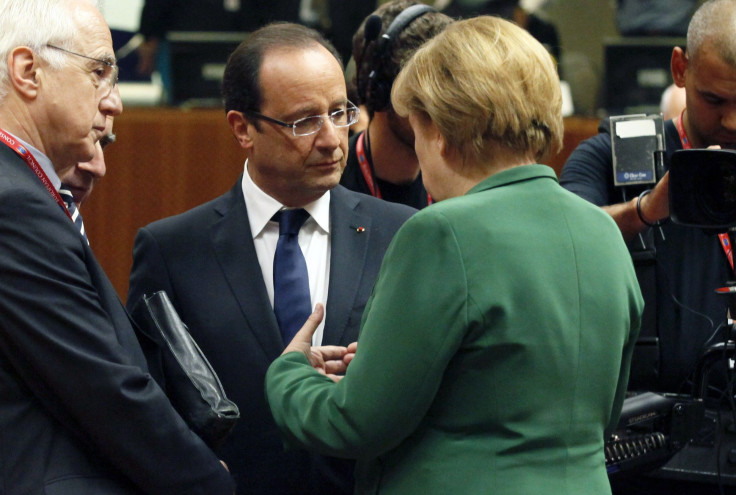Confusion After EU Summit On 'Continuing Dissonance' As To What Germany, France Want

It’s a matter of conventional wisdom among truck drivers, graduate students and emergency room doctors that it's better not to make important pronouncements after pulling a difficult all-nighter. It does not appear, however, that Europe's leaders are privy to that bit of common sense.
As a result, confusion reigned Monday as to what French and German leaders actually accomplished at a two-day, all-night summit that began Thursday and reportedly did not conclude until after the sun was up over Brussels on Friday.
Part of the confusion stemmed from the fact that the early reports were mostly optimistic that Europe’s top politicians had found a breakthrough in negotiations surrounding the creation of a pan-European banking union -- the main topic on the table during last week’s summit.
Leaks sourced Thursday to an unidentified French government official by Reuters suggested Europe’s leadership had taken “a big stride” in agreeing to establish a single bank supervisor in charge of regulating the thousands of banks within the euro zone. According to the source, the legal framework for such a supervision mechanism would begin to be implemented at the start of 2013, with “effective supervision of 6,000 banks … a reality on Jan. 1, 2014.”
But it would later come out the source quoted Thursday was being overly optimistic, as the statement released by the summit leaders Friday simply agreed on the “need to move towards an integrated financial framework” and set the bar at “agreeing on a legislative framework” where that could happen. It also did not mention if the framework would be for all of the euro zone’s banks or simply the several dozen deemed as “systemically-important,” a huge bone of contention surrounding the issue.
Still, the French trumpeted the summit's results, with President François Hollande telling reporters afterward "there was an agreement, a good agreement, on timing and about the banks as whole," and that participants in the meeting had shown "a willingness to progressively put in place the (oversight) mechanism."
Not so the Germans. Almost as soon as Hollande had finished speaking, Chancellor Angela Merkel rained on Hollande's parade, noting it was “very ambitious to have the finance ministers establish the legal framework quickly.”
Openly chiding the enthusiasm of her peer, she went on to say: “We shouldn't disappoint markets by changing short-term announcements again and again.”
The divergence in the core content of the French and German statements is not trivial. France, alongside the peripheral countries of Europe, is pushing for a Europe-wide “banking union” that will serve to regulate the Continent’s houses of finance and, more importantly, backstop any future bailouts required by the banks. Some are hoping the establishment of a banking regulator will allow for the currently negotiated bailout funds to pursue “direct recapitalization” of ailing banks, instead of the current practice of those funds lending to national governments, who then bail out banks within their borders.
The latter idea is supported by the technocratic leaders of the European Union, most notably the European Central Bank (ECB) and the president of the European Council, HermanVan Rompuy, who has said it is necessary to "break the vicious circle between banks and sovereigns."
But Germany and some of the more fiscally robust nations of the euro zone oppose the idea on worries it will result in the ECB rescuing peripheral banking systems by printing money, stoking inflation in the process and leaving the banks who do not take a bailout at a competitive disadvantage. Instead, Germany is demanding a political union, with the attendant loss of sovereignty by national governments, before agreeing to the banking union.
How much the Germans and the French were at odds with each other’s position was clear prior to the summit, with Hollande telling The Guardian newspaper that Europeans’ “common responsibility is to put Europe's interests first” and sniping directly at Merkel, saying that “those who speak most passionately about political union are often the ones who hesitate the most when it comes to making pressing decisions.”
Berlin, for its part, told weekly magazine Der Spiegel no decisions would be made in the summit, which they saw as “only one step on the way to the next meeting of EU leaders in December.”
It certainly seemed the Germans had prevailed during discussions at the summit, with Reuters noting that Merkel had pooh-pooed the entire premise of what establishing a banking union would allow, saying post-summit that “there will not be any back-dated direct recapitalization. If recapitalization is possible, it will only be possible for the future.”
Among groups noting the he-said, she-said quality to Merkel and Hollande’s comments over the weekend were ratings agencies.
“Stark disagreements were apparent in many officials' post-summit announcements regarding the design, desirability and implications of this potential mechanism,” credit rating agency Moody's said in a note to clients Monday, adding “the continuing dissonance among EU leaders on a 'banking union' will continue to undermine sovereign creditworthiness within the euro area and of stressed countries in particular.”
Interestingly, it seemed the convoluted conclusion to last week’s summit was not being felt in the financial markets, which were focused on positive reports of capital inflows back into Greece and ostensibly pro-EU electoral results in Spain. After falling bellow $1.302 on Friday night, the Eurodollar exchange rate -- the most obvious metric of optimism about Europe -- zoomed to highs just shy of $1.308 Monday morning. The currency was recently trading at $1.3049.
© Copyright IBTimes 2025. All rights reserved.





















